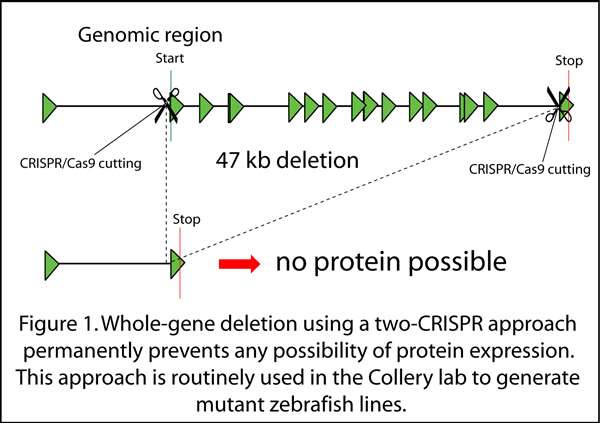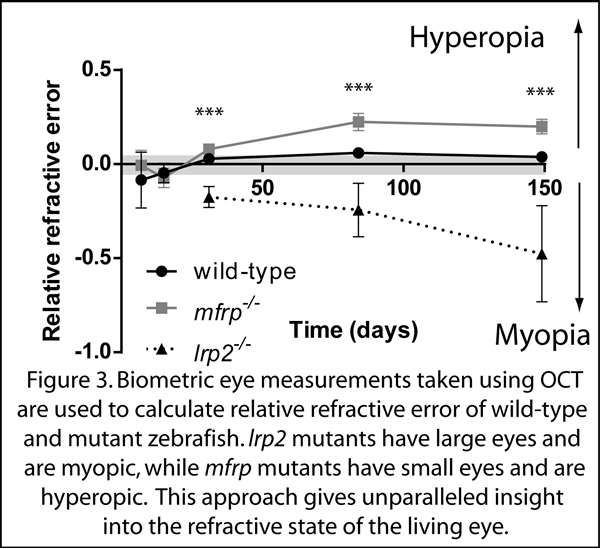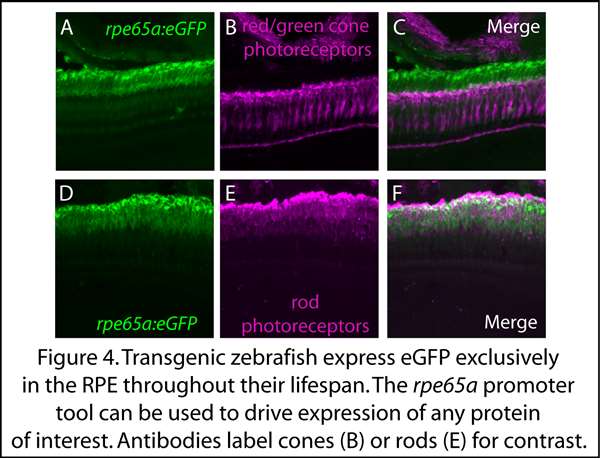Collery Laboratory
Our Mission
We seek to answer questions such as:
How do the retinal photoreceptors develop and communicate with the retinal pigment epithelia?
How do phototransduction and visual cycle proteins contribute to emmetropization and eye size control?
How do errors in eye development affect vision in later life?
How are retinal diseases caused by mutations in genes?
Research Overview

Research Areas
Many blinding disorders profoundly affect the photoreceptors, though the first cells affected in these disorders are often the retinal pigment epithelial cells (RPE). The study of RPE-specific factors is a key interest in the Collery lab, which studies STRA6, a protein found on the basal side of RPE cells vital for transport of vitamin A analogs to the RPE and on to the photoreceptors. Understanding how the loss of STRA6 leads to ocular disease, and how we can treat the symptoms caused by its loss, will increase understanding of how visual disease affects patients, and what we can do to help them.
Investigating how cells and proteins in the eye affect its size and refractive state
Mutations in genes essential for phototransduction and retinoid recycling are often associated with refractive errors such as myopia and hyperopia. This suggests that normal visual responses are important to properly control the size of the eye, and that in their absence, the eye may grow too much (or too little), leading to symptoms of defocus and increased likelihood of pathological damage like glaucoma, cataracts, retinal detachment, and myopic macular degeneration. The Collery lab in investigating the effects of known and novel gene mutations on the refractive state in order to define pathways and cascades that regulate emmetropization of the eye. This work will shed light on some of the most common visual diseases, and will facilitate the search for treatments that can offset their pathological effects.
Laboratory Photos
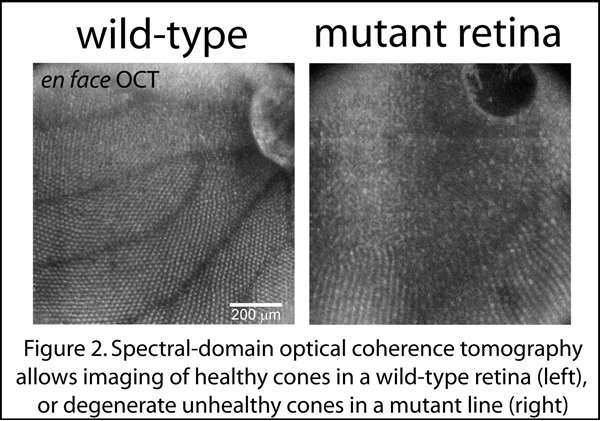
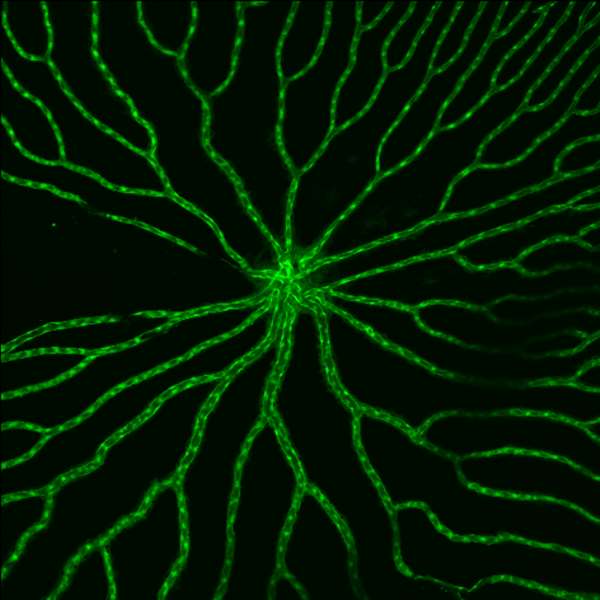
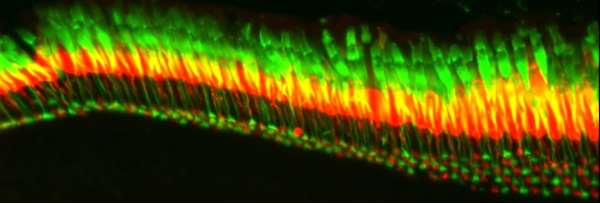
Meet Our Team

Ross Collery, PhD
Associate Professor of Ophthalmology & Visual Sciences; Associate Professor of Cell Biology, Neurobiology and Anatomy

Asher Boucher
Year Entered MCW: 2023

Allison Hall
Year Entered MCW: 2023

Preston Lewis
Medical Student

Signe Kopp
Year Entered MCW: 2024

Emily VanderPloeg
Research Technologist I
Educational Opportunities
Students interested in Graduate Education in the Collery Lab are invited to explore opportunities in the Neuroscience Doctoral Program and the Interdisciplinary Doctoral Program in Biomedical Sciences at the Medical College of Wisconsin.
Past Funding
Title: Understanding genetic causes of refractive error using zebrafish
Children’s Research Institute (CRI) Multi-Year Innovative Research (MIR) grant (co-I)
Title: New Therapeutic Approach for Retinopathy of Prematurity
Present Funding
Title: Development and Validation of Photothermal Optical Coherence Tomography for Retinal Imaging
NIH/NEI R01EY015518 (co-I; Elena Semina, PhD is PI)
Title: Molecular mechanisms of anterior segment disorders
Advancing a Healthier Wisconsin Promising Extramural Score grant (PI)
Title: Retinoid Signaling and Homeostasis
NIH/NEI 5R01EY034842-02 (Ross Collery, PhD is PI)
Title: Retinoid Signaling and Homeostasis in the Eye
Recent Publications
-
Preventing Age-Related Nuclear Cataract Development - Is Cholesterol the Key?
(Subczynski WK, Mainali L, Collery RF, Pasenkiewicz-Gierula M, Widomska J.) Invest Ophthalmol Vis Sci. 2026 Jan 05;67(1):34 PMID: 41537757 PMCID: PMC12814978 SCOPUS ID: 2-s2.0-105027529761 01/16/2026
-
(Fehilly JD, McCann T, Ruddin G, Kaylor JJ, Grenville H, Ward R, Wynne K, Sánchez AG, Strachan E, Travis GH, Collery RF, Kennedy BN.) FASEB J. 2025 Jun 30;39(12):e70754 PMID: 40552921 PMCID: PMC12186719 SCOPUS ID: 2-s2.0-105009298865 06/24/2025
-
(Subczynski WK, Collery RF, Widomska J.) Exp Eye Res. 2025 May;254:110320 PMID: 40043934 SCOPUS ID: 2-s2.0-85219233510 03/06/2025
-
Protocol to perform ex vivo electroretinography on adult zebrafish.
(Simpson SL, Collery RF.) STAR Protoc. 2025 Mar 21;6(1):103565 PMID: 39823232 PMCID: PMC11786734 SCOPUS ID: 2-s2.0-85214862331 01/17/2025
-
The USH3A causative gene clarin1 functions in Müller glia to maintain retinal photoreceptors.
(Nonarath HJT, Simpson SL, Slobodianuk TL, Tran H, Collery RF, Dinculescu A, Link BA.) PLoS Genet. 2025 Mar;21(3):e1011205 PMID: 40067805 PMCID: PMC11925288 SCOPUS ID: 2-s2.0-86000624288 03/12/2025
-
Emc1 is essential for vision and zebrafish photoreceptor outer segment morphogenesis.
(McCann T, Sundaramurthi H, Walsh C, Virdi S, Alvarez Y, Sapetto-Rebow B, Collery RF, Carter SP, Moran A, Mulholland R, O'Connor JJ, Taylor MR, Rauch N, Starostik MR, English MA, Swaroop A, Geisler R, Reynolds AL, Kennedy BN.) FASEB J. 2024 Oct 15;38(19):e70086 PMID: 39360639 SCOPUS ID: 2-s2.0-85205528183 10/03/2024
-
(Eisa-Beygi S, Hu MM, Kumar SN, Jeffery BE, Collery RF, Vo NJ, Lamichanne BS, Yost HJ, Veldman MB, Link BA.) Arterioscler Thromb Vasc Biol. 2023 Jul;43(7):e231-e237 PMID: 37128914 PMCID: PMC10330147 SCOPUS ID: 2-s2.0-85163499929 05/02/2023
-
(Young JB, Al-Kirwi KY, Wynne N, Buchberger AR, Skumatz CMB, Collery RF, Kassem IS.) Exp Eye Res. 2022 Dec;225:109219 PMID: 35985530 PMCID: PMC9910826 SCOPUS ID: 2-s2.0-85140298482 08/20/2022
-
Regulation of the rhythmic diversity of daily photoreceptor outer segment phagocytosis in vivo.
(Moran AL, Fehilly JD, Floss Jones D, Collery R, Kennedy BN.) FASEB J. 2022 Oct;36(10):e22556 PMID: 36165194 PMCID: PMC9828801 SCOPUS ID: 2-s2.0-85138598327 09/28/2022
-
Ablation of mpeg+ Macrophages Exacerbates mfrp-Related Hyperopia.
(Brandt ZJ, Collery RF, Besharse JC, Link BA.) Invest Ophthalmol Vis Sci. 2021 Dec 01;62(15):13 PMID: 34913948 PMCID: PMC8684298 SCOPUS ID: 2-s2.0-85122380090 12/17/2021
-
Optical Coherence Tomography Angiography in the Thirteen-Lined Ground Squirrel.
(Salmon AE, Chen RC, Atry F, Gaffney M, Merriman DK, Gil DA, Skala MC, Collery R, Allen KP, Buckland E, Pashaie R, Carroll J.) Transl Vis Sci Technol. 2021 Jul 01;10(8):5 PMID: 34232271 PMCID: PMC8267221 SCOPUS ID: 2-s2.0-85111034709 07/08/2021


